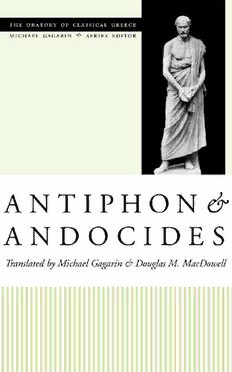Table Of ContentANTIPHON & ANDOCIDES
THE ORATORY OF CLASSICAL GREECE
TranslatedwithNotes u MichaelGagarin,SeriesEditor
volume i
ANTIPHON & ANDOCIDES
Translated by Michael Gagarin & DouglasM.MacDowell
university of texas press, austin
The publication of this book was assisted by a
University Cooperative Society Subvention Grant
awarded by the University of Texas at Austin.
Copyright © 1998 by the University of Texas Press
All rights reserved
Printed in the United States of America
Second paperback printing, 2006
Requests for permission to reproduce material from
this work should be sent to:
Permissions
University of Texas Press
P.O. Box 7819
Austin, TX 78713-7819
www.utexas.edu/utpress/about/bpermission.html
(cid:1)(cid:1) The paper used in this book meets the minimum
requirements of ansi/niso z39.48-1992 (r1997)
(Permanence of Paper).
Library of Congress Cataloging-in-Publication Data
Antiphon, ca. 480–411 b.c.
Antiphon and Andocides / translated by Michael
Gagarin and Douglas M. MacDowell.—1st ed.
p. cm. — (The oratory of classical
Greece ; v. 1)
English translations of classical Greek orations of
Antiphon and Andocides.
Includes bibliographical references and index.
isbn 13: 978-0-292-72808-0 (alk. paper). —
isbn 10: 0-292-72808-5
isbn 13: 978-0-292-72809-7 (pbk. : alk. paper)
isbn 10: 0-292-72809-3
1. Antiphon, ca. 480–411 b.c.—Translations into
English. 2. Andocides, ca. 440–390 b.c.—Translations
into English. 3. Speeches, addresses, etc., Greek—
Translations into English. 4. Oratory, Ancient.
I. Andocides, ca. 440–ca. 390 b.c. II. Gagarin,
Michael. III. MacDowell, Douglas M. (Douglas
Maurice) IV. Title. V. Series.
pa3869.a3 1998
885(cid:2).01—dc21 97-21207
TT55998800--ccooppyyrriigghhtt--22000066..iinndddd 11 44//1100//0066 1111::1155::0022 AAMM
CONTENTS
Preface vii
SeriesIntroduction(MichaelGagarin) ix
OratoryinClassicalAthens ix
TheOrators xii
TheWorksoftheOrators xv
GovernmentandLawinClassicalAthens xvii
TheTranslationofGreekOratory xxiv
Abbreviations xxv
NoteonCurrency xxv
BibliographyofWorksCited xxvi
ANTIPHON (MichaelGagarin) 1
Introduction 3
1.AgainsttheStepmother 9
TheTetralogies 17
2.FirstTetralogy 19
3.SecondTetralogy 30
4.ThirdTetralogy 40
5.OntheMurderofHerodes 48
6.OntheChorusBoy 73
Fragment1.OntheRevolution 90
ANDOCIDES (DouglasM.MacDowell) 93
Introduction 95
1.OntheMysteries 99
2.OnHisReturn 141
3.OnthePeacewithSparta 148
4.AgainstAlcibiades 159
Index 171
THIS PAGE INTENTIONALLY LEFT BLANK
PREFACE
ThisisthefirstvolumeinaseriesoftranslationsofTheOratoryof
Classical Greece. The aim of the series is to make available primarily
for those who do not read Greek up-to-date, accurate, and readable
translations with introductions and explanatory notes of all the sur-
vivingworksandmajorfragmentsoftheAtticoratorsoftheclassical
bc
period (ca. 420–320 ): Aeschines, Andocides, Antiphon, Demos-
thenes,Dinarchus,Hyperides,Isaeus,Isocrates,Lycurgus,andLysias.
Iamgratefulforthesupportthisserieshasreceivedfrommyfellow
translators,fromcolleaguesinthefield,andfromeveryoneattheUni-
versityofTexasPress.DirectorJoannaHitchcockencouragedtheproj-
ect from the beginning, when it was only a vague idea; Humanities
Editor AliHossainiandhissuccessor,JimBurr,havebeenverysup-
portiveandhelpfulwithnumerousaspectsoftheproject;andthestaff,
including Carolyn Wylie and copyeditor Nancy Moore, have been
constructivelyhelpful.
Publication of this first volume has been assisted by a subvention
grant from the University Cooperative Society,awardedbytheUni-
versityofTexas atAustin.TheCoopisto be commendedforitsco-
operationwithandsupportoftheUniversityofTexasfaculty.
—m. g.
THIS PAGE INTENTIONALLY LEFT BLANK
SERIES INTRODUCTION
GreekOratory
By MichaelGagarin
oratory in classical athens
From as early as Homer (and undoubtedly much earlier) the
Greeksplacedahighvalueoneffectivespeaking.EvenAchilles,whose
greatnesswasprimarilyestablishedonthebattlefield,wasbroughtup
to be ‘‘a speaker of words and a doer of deeds’’ (Iliad 9.443); and
Athenianleadersofthesixthandfifthcenturies,(cid:49)suchasSolon,The-
mistocles,andPericles,wereallaccomplishedorators.MostGreeklit-
erarygenres—notablyepic,tragedy,andhistory—underscoretheim-
portance of oratory by their inclusion of set speeches. The formal
pleadingsoftheenvoystoAchillesintheIliad,themessengerspeeches
in tragedy reporting events like the battle of Salamis in Aeschylus’
PersiansorthegruesomedeathofPentheusinEuripides’Bacchae,and
thepowerfulpoliticaloratoryofPericles’funeralorationinThucydi-
desarebutafewofthemostnotableexamplesoftheGreeks’never-
ending fascination with formal public speaking, which was to reach
itsheightinthepublicoratoryofthefourthcentury.
In early times, oratory was not a specialized subject of study but
waslearnedbypracticeandexample.Theformalstudyofrhetoricas
an‘‘art’’(techn¯e)began,wearetold,inthemiddleofthefifthcentury
inSicilywiththeworkofCoraxandhispupilTisias.(cid:50)Thesetwoare
(cid:49)All dates in this volume are bc unless the contrary is either indicated or
obvious.
(cid:50)SeeKennedy1963:26–51.Cole1991haschallengedthistraditionalpicture,
arguingthattheterm‘‘rhetoric’’wascoinedbyPlatotodesignateanddenigrate
anactivityhestronglyopposed.Cole’sownreconstructionisnotwithoutprob-

